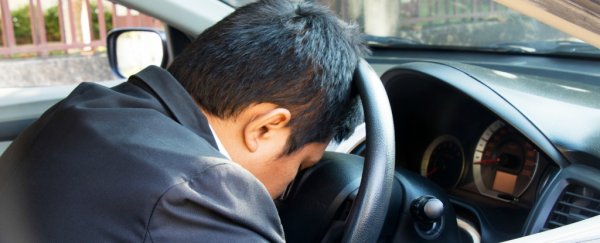With the holiday season well underway, it's as good a time as ever to understand how your brain functions when driving on those long car trips.
Research suggests that being tired or distracted while driving accounts for 20 and 25 percent of road crashes respectively, with tired drivers even more likely to undergo distracting behaviours.
In fact, some studies (and Mythbusters) have shown that driving while tired can be just as bad as driving drunk.
But what is it exactly that makes our brains so bad at staying focussed on the road when we're exhausted? Recent research suggests it's our brain actually looking for ways to keep itself awake.
"When we get sleepy and we are performing a monotonous task such as driving, we tend to look for other things that give us a boost to increase our alertness," said Chris Watling, a road safety researcher from the Queensland University of Technology (QUT) in Australia.
"Studies have shown sleepy drivers undertake more distracting-type behaviours to increase their levels of alertness such as gazing at passing scenery and speeding in an attempt to increase their focus on the task of driving."
But it's not only that – it is likely that some tired drivers might also reach for their phones when driving to increase their alertness – an obvious issue when you're supposed to be keeping your eye on the road.
"These behaviours were found to be more prevalent when driving long distances, which at the same time are increasing levels of sleepiness due to the time-on-task effect," says Watling.
Plus it's us young people who are most at risk for these behaviours – although Watling does admit it could happen to anyone.
"Sleep is essential for a healthy body and mind but young people's sleep is often compromised by social activities, work or educational commitments," he says.
"Given young drivers are over-represented in crash statistics and more likely to be impaired by sleepiness and distraction, it is vital that we look at ways to reduce these behaviours and our focus should be on young drivers."
"That said no driver is immune to sleepiness and sleepiness is a state that most, if not all drivers on our road has experienced, and is habitually exposed to," Watling adds.
But until we finally all have self-driving cars to drive us wherever we need, are there any solutions to keep yourself occupied?
Right now, the best advice is try to ensure you are well rested, especially before a long drive, be mindful of experiencing any signs of sleepiness (like yawning, and difficulty concentrating on the road) and avoid distractions.
This could be as simple as moving your phone out of reach, or turning it to silent when you're driving. Frequent naps and coffee breaks are also always a good idea when you're embarking on a long drive.
In the meantime, we'll just be here waiting for driverless cars to finally become a reality.
Watling presented his research at a seminar at QUT last week.
Queensland University of Technology is a sponsor of ScienceAlert. Find out more about their research.
